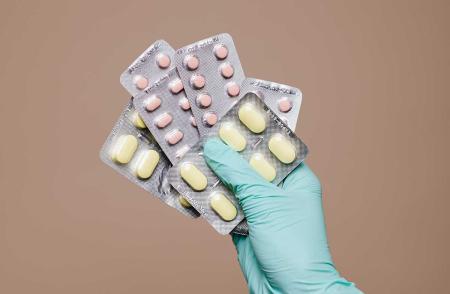 | « Back to article | Print this article |
Indian pharmaceutical companies are stepping up their efforts to combat the problem of counterfeit drugs, employing a variety of strategies, from packaging innovations to engaging private investigation agencies.

The stakes are high, as counterfeit medicines not only harm consumers but also tarnish the reputation of leading brands.
Earlier in September, an interstate gang was busted for distributing fake antibiotics to some government hospitals.
The drugs — which contained nothing more than talcum powder and starch — were being manufactured in a veterinary medicine laboratory in Haridwar.
These fake antibiotics were then circulated across several states, including Uttar Pradesh, Uttarakhand, Jharkhand, and Maharashtra, before being uncovered by the Nagpur Rural police.
After a list of drugs that failed quality tests was released in August by the Central Drugs Standard Control Organisation (CDSCO), several prominent domestic pharmaceutical companies — including Torrent Pharmaceuticals, Sun Pharmaceutical Industries, and Alkem Laboratories — issued urgent clarifications, insisting the medicines flagged were, in fact, counterfeit, and not manufactured by them.
The substandard drugs named by the CDSCO included popular brands such as Pan-D, Clavan 625, Pantocid, and Shelcal 500.
To stamp out counterfeit drugs from the market, the Indian drug regulator in mid-2023 had called for strict implementation of barcodes or QR codes on top 300 medicine brands such as Allegra, Shelcal, Calpol, Dolo, and Meftal Spas.
Many firms have now implemented such QR codes on a range of their most trusted brands to allow consumers to quickly verify the authenticity of the medicines.
“Some of our leading brands now feature QR codes printed on the label, enabling patients to check authenticity by simply scanning them.
"We’ve also introduced a 3D security strip for further protection,” said Sun Pharma in a statement.
A spokesperson for Torrent Pharma told Business Standard: “We’ve periodically conducted raids and initiated litigation against counterfeit drug offenders to protect the integrity of our brands.”
The company is now working with professional investigation agencies to monitor the market, identify counterfeit dealers, and take enforcement actions when necessary.
In addition, Torrent Pharma has made packaging changes to its top brands, adding QR codes and implementing advanced printing techniques as an added layer of protection.
“Shelcal has a specifically designed mono carton to carry the QR code for primarily this purpose,” the spokesperson said.
The companies are also urging consumers to take an active role in this battle against counterfeit drugs.
“We strongly encourage patients and consumers to scan the QR codes to verify the authenticity of their medicines before using them,” Torrent Pharma advised.
Packaging reforms are gaining traction across the industry.
Ashish Moghe, managing director of Nipro PharmaPackaging, explained that new options for secure packaging are now available.
“One can print brand names with special ink that glows under UV light. This can be applied to ampoules and vials,” he said.
Moghe acknowledged that the cost of such packaging is roughly five times higher than conventional packaging, but he argued that this expense is relatively minimal vis-à-vis the cost of manufacturing.
“For a Rs 100 drug, the packaging cost would be not more than Rs 1-2.
"Companies will need to decide which high-volume, high-value brands warrant this investment.”
Distinguish between NSQ and spurious: Drugmakers to CDSCO
Meanwhile, the Indian Pharmaceutical Alliance (IPA), representing the nation’s largest pharma firms, has called on the CDSCO to make a clear distinction between spurious drugs and non-standard quality (NSQ) drugs.
The IPA expressed concern over the reputational damage caused when media coverage conflates the two terms.
Sudarshan Jain, secretary general of the IPA, warned that such misrepresentation can have severe consequences.
“It is critical that a clear distinction between NSQ and spurious drugs is made. This issue is of paramount importance, both for India’s global standing and the protection of public health,” he said.
Disclaimer: This article is meant for information purposes only. This article and information do not constitute a distribution, an endorsement, an investment advice, an offer to buy or sell or the solicitation of an offer to buy or sell any securities/schemes or any other financial products/investment products mentioned in this article to influence the opinion or behaviour of the investors/recipients.
Any use of the information/any investment and investment related decisions of the investors/recipients are at their sole discretion and risk. Any advice herein is made on a general basis and does not take into account the specific investment objectives of the specific person or group of persons. Opinions expressed herein are subject to change without notice.